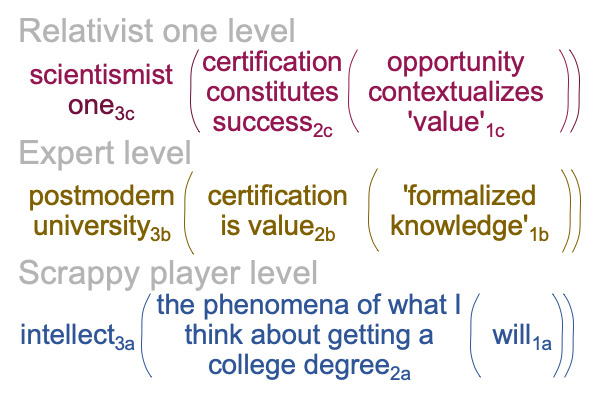0183 Chapter thirteen is titled, “Thinking in the Fourth Order: The Role of Metalepsis in the Post-Truth Condition”.
The fourth challenge of any crisis is a fight over what the lessons from winning the fight broadly mean.
In other words, fourth-order thinking is a fight over the meaning of success2c.
Today, success2c for the all-but-divine post-truth perspective-level normal context3c does not seem to coincide with what the scrappy player regards as the success2a that is to be attained by submitting the player’s will1a to the situation-level potential1b of formalized knowledge.
0184 Indeed, the discrepancy is palpable.
Just ask a highly indebted graduate of a well-known university who has earned a degree in a psychometric discipline,where capitalist values entail skills in manipulation and where socialist values entail skills in propaganda.
Where are the jobs?
“Oh,” say the experts at the One Economic Forum, “You are already a success because of your credentials2b in the psychometric sciences3b. You have pleased the gods of scientism3c. You will own nothing and you will be happy.”
0185 Then, the former student receives a thick envelope from a loan agency containing a book full of expected payments. Here are coupons… er… I should say… your monthly bills for the loans that you took out. You can make our work more convenient by allowing the loan agency to automatically remove the amount of the bill from your checking account on a monthly basis.
Yes, the discrepancy is palpable.
0186 The graduate begins to understand that he has already been sacrificed for the scientismist one’s success2c.
Success2c for the system is not the same as success2a for an individual within the system.
Oh, the capriciousness of the gods.

0187 What about metalepsis?
Metalepsis is a rhetorical trope where something imaginative is taken to be real.
How curious.
So, which does metalepsis go with, illusion or delusion?
Consider the following definitions, which occur in Looking at Alex Jones’s Book (2022) “The Great Reset”, appearing in Razie Mah’s blog at the start of January, 2023.
An illusion is a mind-independent being that is regarded as mind-dependent.
A delusion is a mind-dependent being that is regarded as mind-independent.
0188 Well, obviously, the rhetorical trope of metalepsis must be a delusion.
Something imaginative is taken to be real.
All the experts are satisfied.
Metalepsis is madness.
0189 Oh, wait, do I feel a Gestalt shift coming on?
Is everything that seems to be mind-dependent becoming mind-independent?
Including the labels?
Does that mean that the rhetorical trope of metalepsis may be an illusion?
The experts are satisfied that metalepsis2a (as a mind-independent phenomenon) is madness1b (a mind-dependent formalization) because they regard metalepsis2a as a reticence that questions, does not submit to, and does not want to participate in1b, the acknowledgment that the relativist one3c is scientism3c. Outside of science3c, everything is relative. Science3c does not dwell in the jurisdiction of all other knowledge traditions. In fact, science3c rises above all other academic turfs3b. Science3c eclipses all academic fiefdoms3b.
0190 But, let me re-examine the definitions of metalepsis, illusion and delusion once again.
In metalepsis, something imaginative is taken to be real.
“Something imaginative” appears to be mind-dependent, and that is what illusion creates. When a mind-independent being (such as a decision2c by the one of scientism3c) appears as mind-dependent (as opinions of people about something2a), then something real becomes something imaginative. That fits the definition of illusion.
“Something that is believed to be real” appears mind-independent, and that is what delusion creates. When a mind-dependent being (such as opinions2a) appears as mind-independent (phenomena observed and measured by the experts in the psychometric sciences1b), then something imaginative becomes something real.
0191 Yes, the expert can regard metalepsis as delusional.
But, illusion is near at hand.
